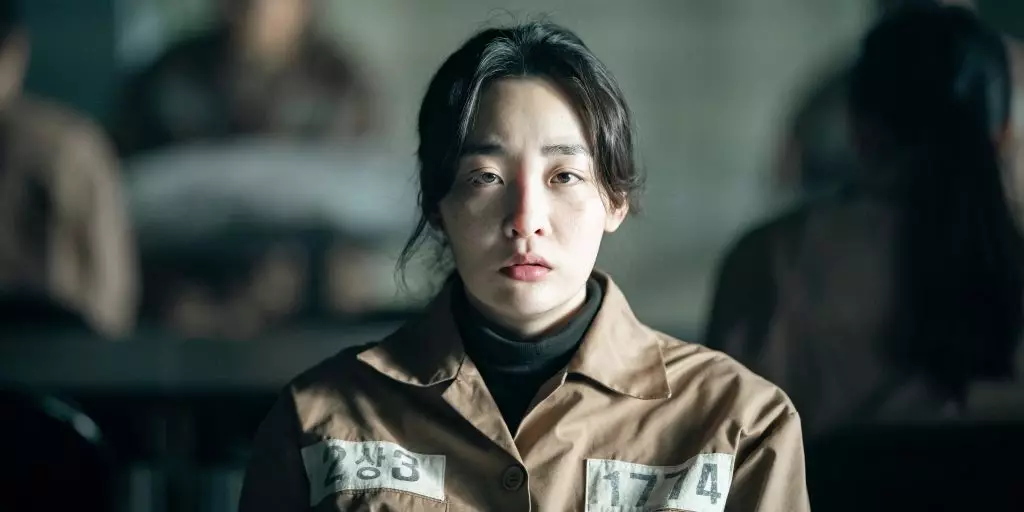The South Korean film industry continues to captivate global audiences with its rich storytelling and nuanced performances. One of its rising stars, Minha Kim, steps into the limelight once again, this time as the lead in “A Girl with Closed Eyes,” directed by Chun Sun-young. Following her notable role in AppleTV+’s acclaimed series “Pachinko,” Kim’s latest portrayal brings forth a complex narrative intertwined with crime, mystery, and deep-rooted secrets. This film, which premiered at the prestigious Busan International Film Festival, promises not just a showcase of riveting performances but also a deeper engagement with the genre of crime thrillers.
“A Girl with Closed Eyes” opens with a gripping scene that immediately immerses viewers into its dark world. The film introduces us to Min-ju (played by Kim), who finds herself in a harrowing situation—standing over a deceased author, Jeong Sang-woo (Lee Ki-woo), with a smoking gun in her hand. The setup is classic for crime dramas, igniting the intrigue of the audience who are drawn into questioning her innocence from the onset. However, as the plot thickens, Kim’s character unveils an unexpected twist. She claims to be Lee In-seon, the victim of a notorious kidnapping case from two decades prior, a narrative that not only complicates her character’s motives but also enriches the story’s emotional depth. Furthermore, her interaction with Detective Park Min-ju (Choi Hee-seo), her former classmate, introduces layers of personal conflict—the estranged relationship bears weighty implications as the narrative unfolds.
The film adeptly explores the dynamics between the personal and the professional, especially as Park grapples with returning to her hometown and confronting unresolved sentiments. The tension escalates as new characters are introduced, including Jeong’s publisher, who incites public pressure for a swift judicial resolution. This commentary on societal pressures adds a fascinating dimension to the film, emphasizing how public perception can influence justice—a theme often echoed in contemporary crime stories.
Chun Sun-young’s direction shines through in the film’s atmospheric build-up, which draws on a blend of influences ranging from “Memories of Murder” and “Confession of Murder” to literary nods like Stephen King’s “Misery.” The director seems to wear these influences not just as a badge of honor but also as a groundwork from which to explore originality. The thrilling interrogation sequences throughout are reminders of the intricate dance between truth and deception, propelling the narrative forward.
Despite its ambitious storytelling, “A Girl with Closed Eyes” is not without its flaws. The latter half of the film veers into a maze of improbable twists that detract from the robustness established in the first hour. The introduction of numerous red herrings creates a layer of complexity that, while initially engaging, ultimately leads the plot into disarray. Viewers may find themselves struggling to connect the dots in a resolution that feels rushed and somewhat unsatisfying.
Yet, even amid narrative pitfalls, the film boasts strong performances that anchor it. Minha Kim’s portrayal of In-seon is particularly noteworthy, where she expertly oscillates between innocence and manipulation, drawing viewers into her internal struggle. Her past role in “Pachinko” equipped her with the emotional range necessary to tackle such a multifaceted character—a trait that remains evident in her performance.
“A Girl with Closed Eyes” serves as Chun Sun-young’s feature debut, and despite its narrative missteps, it signifies an important step in the South Korean cinematic landscape. While the plot ultimately falters under the weight of its ambitious twists, the film remains an intriguing exploration of crime and personal redemption. With captivating performances and a compelling opening act, it sets a foundation for future works that could potentially refine and elevate the narrative complexity presented here. The film might not fully deliver on its promise, but it is a thought-provoking entry—a reminder that every new voice in cinema adds to the tapestry of storytelling and evokes reflection.


Leave a Reply